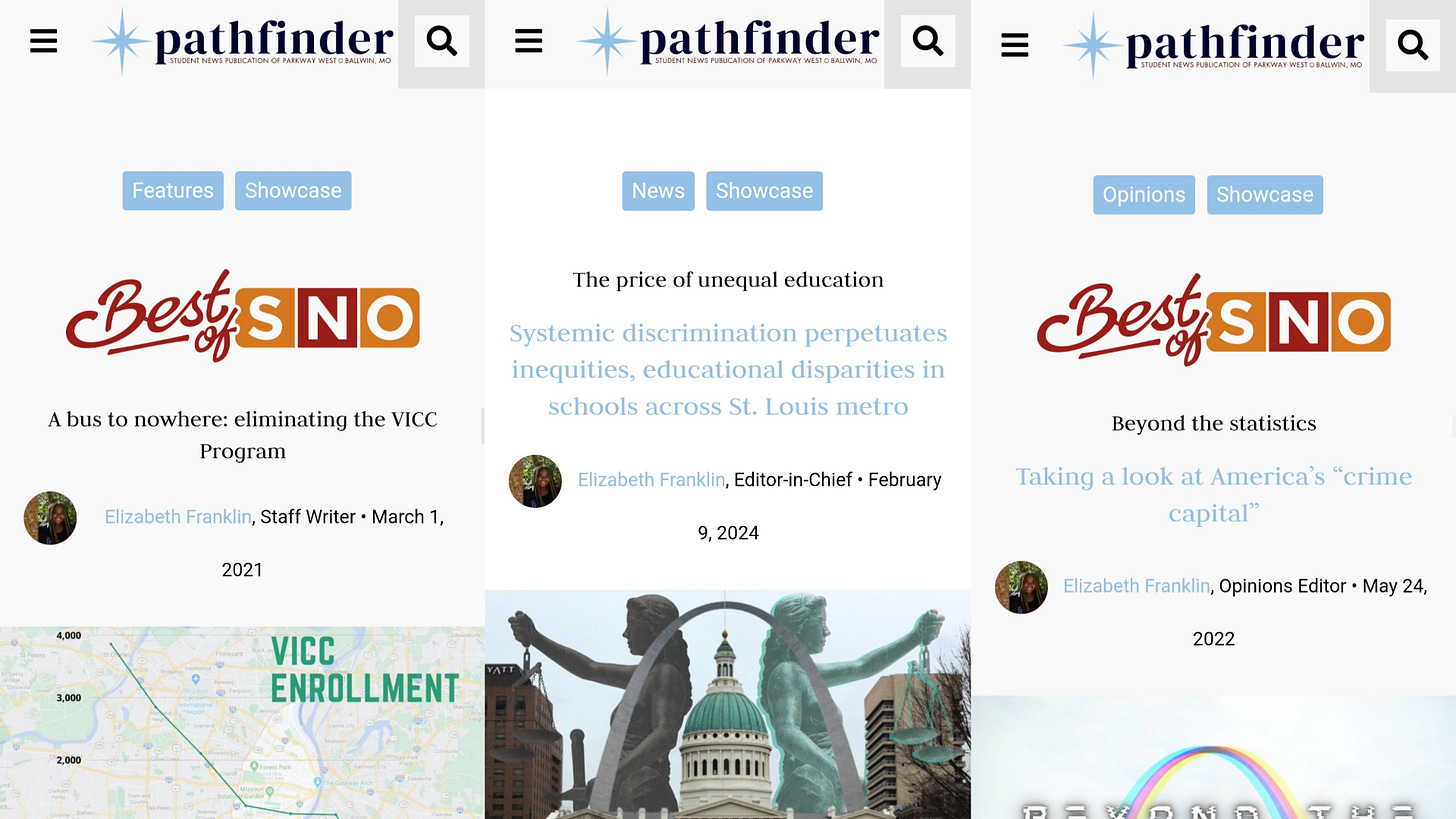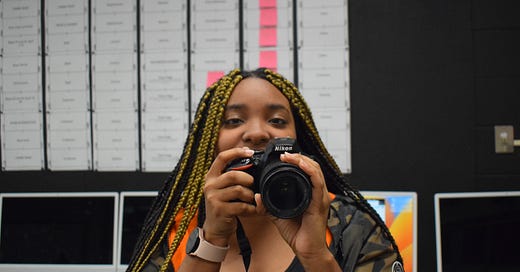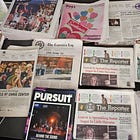Amplifying 'overshadowed' voices in St. Louis
Meet Elizabeth Franklin, Missouri high school student journalist of the year
Elizabeth Franklin drew on her lived experiences to highlight systemic inequities in St. Louis.
From reporting on the price of unequal education to shining light beyond the statistics of America’s so-called crime capital, Franklin said she wanted to use her platform to highlight systemic inequities and amplify marginalized voices.
“Journalism is a great tool to make people see while this is our normal, it doesn't have to be,” she said. “There can be a better way. That's something that I've tried to express in my stories and something that I'm proud of looking back on.”
The former editor-in-chief of Pathfinder at Parkway West High School in Ballwin, Missouri, is heading to Dillard University to pursue her goal of becoming a civil rights attorney.
In this Q&A, Franklin shared how her observations at school turned into in-depth stories and the importance of speaking up for others.
The responses have been edited for grammar, flow and concision.
Why did you join your school newspaper?
My school’s journalism program has two sections: yearbook and newspaper. I wanted to be in the yearbook because I thought it was cool how you could put stuff together and design pages that everybody gets to see. I wasn't interested in the newspaper.
I ended up going to the newspaper because my teacher just ended up flopping me in the newspaper. I think my teacher saw how much of a passion I had for writing and she put me where she thought I would grow the most and I think that turned out to be a pretty good decision.
Tell me about your passion for writing.
My parents have always been very passionate about reading and writing.
Coming from a Black family whose ancestors were heavily into the education sector and heavily into getting that education they weren't able to receive, that was something that was pushed on me as a child.
My favorite book is “Roll of Thunder, Hear My Cry” by Mildred D. Taylor. Because I read a lot, I felt like it was kind of natural that I would also want to express myself in the way that I saw others expressing themselves.
I would write stuff about my life. I would write plays. Anytime there was an essay we had to do in class, I would write so much and be so verbose and very flowery with my language.
What type of stories do you cover at Pathfinder?
I wanted to make sure that a lot of my stories are about the school community, but also about the people who are not very much seen in the community — like the people with overshadowed voices.
One of the big demographics for me was the Black population.
I went to a predominantly white school. St. Louis was very, very, very segregated and it continues to be segregated today. The historical and economic inequities are still very apparent in the schools today.
I knew that as a Black student at a predominantly non-Black school, you're going to face microaggression; you're going to face issues with diversity; you're going to face problems with teachers and problems with peers.
I didn’t only want to create stories that display what we go through today but also the historical inequities that made it so that we go through those things now — to explain sort of how that all comes together into systemic discrimination.

How did you come up with ideas for these stories?
A lot of those story ideas were sparked by something that I saw in my own life and I kind of wanted to use the platform that I had kind of been thrust upon me to share those stories.
A bus to nowhere: eliminating the Voluntary Interdistrict Choice Corporation Program
This was my first ever story. It was about a desegregation program in St. Louis that ended. It was a big program for a few years.
There was news that the program was shutting down for good. I wanted to see what the effects would be on the students. And not only the Black students but every student in the school and how the lack of diversity would affect the entire school environment.
I wanted to feature voices. I know I featured one girl who was a freshman at the time, and then she had a sister who was coming into the program. Her sister is the last generation of VICC students. I just thought that was so interesting.
I also interviewed a principal at my school, an administrator who would see how the demographics change over time. I also talked to some people from the district who gave me some official numbers on how it affected diversity and how it could affect future trends.
Beyond the statistics: Taking a look at America’s “crime capital”
I was having an argument with some of my classmates who said something bad about St. Louis, like “It was just a monolithic city.” And I was like you haven’t even been there.
Most of these people would say there are dangerous places in the city. But they’re also kind of sucking the humanity out of the city and the people who actually live there who are just trying to get by and living their life.
Then another portion, my AP world teacher had this assignment for her students where she would give extra credits if students went to a restaurant of their choice in North St. Louis County.
Parents were complaining about it because they didn’t want to send their kids to the dangerous parts of town, even though those were not dangerous parts of town. They’re literally just relegating the stereotypes that the city has.
That was the interesting observation I made that spiraled into writing the beyond-the-statistics story.
The price of unequal education: Systemic discrimination perpetuates inequities, educational disparities in schools across St. Louis metro
That one was interesting because I had started that story in my sophomore year. It was supposed to be a sequence to the beyond-the-statistics story in a way.
I made it more about the observations that we see today. And the history and the educational inequities in St. Louis and unfortunately, a lot of those fall on primarily and predominantly Black school districts.
I wanted to juxtapose the two images of the affluence versus the low socioeconomic status schools in each district because it really is bonkers. You can step from a block down from a school and you'll be in a whole different economic status.
What was the most challenging part of reporting on these stories?
I'm not even going to lie. One thing that I have been struggling with as a journalist is the lack of motivation and procrastination, which is not great.
It was hard for me to find the correct voice because if I couldn't find the correct shape of the story then it would be hard for me to kind of go with it.
I know that like for the price-of-unequal-education story, I started that story in my sophomore year and spent two years figuring things out. I finally got really inspired in January this year. And then I wrote it.
Looking back, how do you feel that you were able to tell these St. Louis stories?
It was so great to have had this impact on other people.
Just looking back on all these stories and how many people have reached out to me and said “Yes, I have felt this. I felt this in my school.”
I don't even know how to describe it, but it's such a great feeling to be able to do that for people, especially for people who feel like they don't have that sort of voice or that sort of power.
Journalism is a great tool to make people see while this is our normal, it doesn't have to be our normal, there can be a better way. That's something that I've tried to express in my stories and something that I'm proud of looking back on.
What's next for you?
I'm attending Dillard University in New Orleans for an urban studies and public policy degree with potential minors in French and film studies.
Both of my parents are graduates of HBCUs. Having that kind of community behind you, it's really empowering. I feel I'm going to have so much fun there.
There are a couple of things I want to be, but one of the main things is a civil rights attorney.
So after Dillard, I'm planning on going to law school. Although it's in a different setting from being a journalist, I would love to be that voice and explore what that will be like being a civil rights attorney.
📣 From Our Partner:
Check out The Journalism Salute (the podcast on which I guested) for one of its recent episodes, an interview with Pulitzer Prize-winning artist Medar De La Cruz.
Medar has done two illustrations in his journalism career, the second one was for The New Yorker and won the Pulitzer for illustrated reporting and commentary.
The subject: What it's like to work as a library assistant in a prison. Medar's is an amazing story about making the most of an opportunity.
📰 Story Spotlight:
Letter from the Editors | On today’s arrests at the president’s office (The Stanford Daily): A student reporter was falsely imprisoned on a $20,000 bail, in connection with an attempted pro-Palestine occupation of the president and provost’s office.
Stony Brook University’s administration actively works to stifle student journalists (The Statesman): If student journalists want anything from the administration, they must fill out a “Journalism Students Inquiry” form that requires them to disclose interview questions in advance and list sources for the story they are working on.
Free speech controversy at Sacramento high school jogs memories of my own start in journalism (CalMatters): Students at Sacramento’s McClatchy High School learned last month that if officialdom feels uncomfortable, it will trample on free speech. An advisor was suspended after printing a quote about Hitler.
Featured Opportunities:
Join the presidents of leading media associations as they tackle the challenges facing collegiate and post-graduate media at the “State of the Profession” Confab webinar June 11.
Join PEN America for training to equip journalists with practical tools and strategies to defend against online abuse June 11.
The Financial Times is seeking a one-year newsroom fellow. The application deadline is June 20.
The Journalism Institute is hosting a webinar on “Election 2024: Crafting Sharp & Responsible Headlines for Your Political Stories” June 21.
Renaissance Journalism Center’s application for its LaunchPad Fellowship for NextGen Journalists is now live until July 12.
Block Club Chicago is seeking pitches for Chicago-based Pride Month stories.
Military Times and Defense News are looking for Washington, D.C.-based interns and fellows.
I want to hear from you: What type of stories do you want to see in The Nutgraf? Is your student publication doing something cool that you’d like to share? Reach me at nutgrafnews@substack.com. I will respond! Also, please share.








